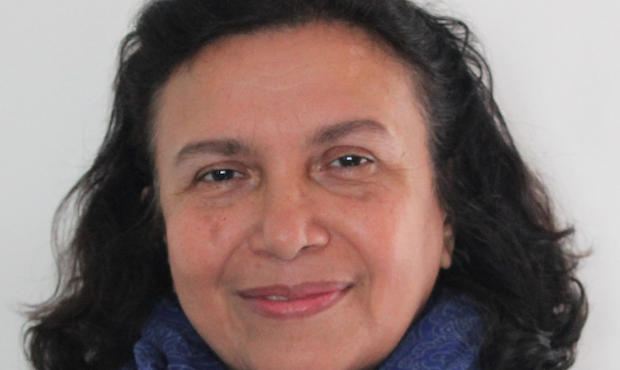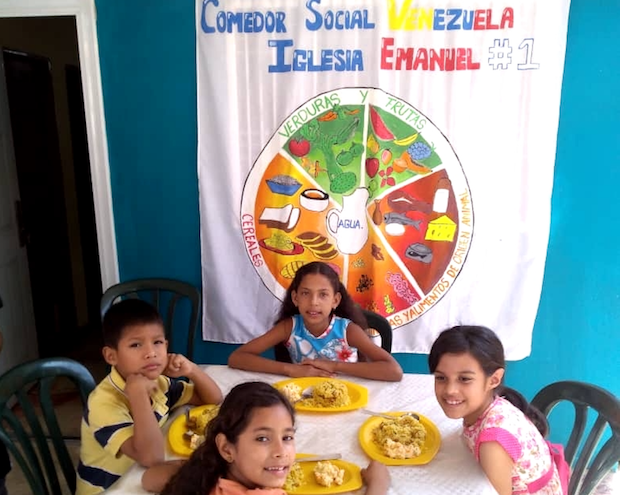No electricity, no water... Observing Covid-19 measures is almost impossible in Maracaibo
The NGO ‘Alianza Solidaria’ works with churches in Venezuela to keep the soup kitchens that distribute food to vulnerable children and their families open.
Protestante Digital · CARACAS · 26 MAY 2020 · 16:10 CET
How do you deal with an epidemic like that of Covid-19 without guaranteed access to water, with constant cuts in electricity supply and food shortages?
This is the challenge in some areas of Venezuela, such as the most marginalised neighbourhoods in the city of Maracaibo. There, for more than a year, different evangelical churches have distributed food to the neediest families through children's soup kitchens, with the support of Alianza Solidaria (Solidarity Alliance), a small NGO based in Spain.
According to the organisation, during this period it has been possible to provide a daily ration for five days a week to a total of 202 boys and girls. 133 of them, have managed to finish the year with a balanced weight and reach the development curve necessary for their age.
The churches that have provided the facilities have taken this opportunity as a way to share the gospel with children and families.
However, since the epidemic has reached Venezuelan soil and confinement has begun, “it has not been possible to provide hot meals to children due to the required social distancing”, explained Rosa Camargo, who advises the teams responsible for the soup kitchens. She also works with caregivers and is the manager of the Tearfund organisation in Latin America.

Rosa Camargo
Question. What is the impact that Covid-19 is having on the soup kitchens that Alianza Solidaria supports in Venezuela and on the border with Colombia?
Answer. The soup kitchens provide nutritional support to more than 200 girls and boys from the communities of Integración Comunal, La Rinconada, Marite and Nelson Mora.
These children have remained healthy in recent months thanks to the comprehensive care they receive in the project. Every day the children receive a balanced meal and participate in activities that allow their emotional and spiritual development. Their families are also being supported with training and guidance to decrease the incidence of acute diarrheal disease, which is recurrent because there is no treated water in the neighborhoods of Maracaibo. Thanks to this support, more than 60% of children remain on the normal growth and development curve for their age.
Since the confinement began, it has not been possible to provide cooked food to the children because the social distancing required by the government does not allow meetings, but mainly because the closure of the border with Colombia does not allow food to pass to the churches. Mobility between the two countries is also not possible. However, despite these tremendous limitations, the church is sharing dehydrated food with families that had arrived before the closure by Covid-19, and providing emotional and spiritual care. Something very interesting that has happened is the way in which parents have joined in prayer and support groups using networks like WhatsApp.
Q. Everywhere there has been constant talk of taking precautionary measures. How are these measures being applied in the soup kitchens?
A. We are training dining room managers in personal protective measures in preparation for the reopening. However, we are aware that more direct support will have to be provided to ensure that they have the elements required for protection and prevention such as the supply of soap, masks and disinfectants, since it is not easy for them to acquire them in Venezuela. The issue of water is especially critical since in the communities where the soup kitchens operate, there is no consistent running water, sometimes it only arrives once a week. We thank God that we have experts who help with training in personal protective measures.
Q. It is clear that not all groups of the population were prepared to face this crisis in the same way. In what way have you been able to verify this from Venezuela?
A. Neither the government nor the health system in Venezuela has the capacity to handle the pandemic. In fact, nobody knows exactly how many are infected or how many are killed.
In the few hospitals that still operate, there are not the necessary personal protective elements or enough ventilators for the sick. A critical part is the lack of doctors and nurses, as many have migrated to other countries.
Civil society and church organisations have taken the lead in informing the population in the absence of a government strategy.

The expansion of the epidemic has made it so that only baskets with processed food can be distributed. / Alianza Solidaria Q. What are you expecting for the families?
A. Everyone is facing the situation as best they can since government aid is sporadic and does not reach the entire population. But there is much fear and uncertainty which is a conducive environment for disinformation.
The church is playing an important role in providing information that is realistic and helps to cope with the pandemic. From Barranquilla (Colombia), weekly online meetings have been held with leaders to coordinate actions and to train them not only in personal protective measures but also in topics such as counseling for families, adults and children affected by confinement.
Q. There has been a lot of debate in Europe about how different governments have applied different measures to slow the spread of the epidemic. What measures have been applied there?
A. The government has taken measures such as social distancing, home confinement, and the closing of schools and universities. However, the need to look for food on a day-to-day basis means that these measures are not observed. Just to give an example, in Venezuela at this time there is no electricity for most of the time, which does not allow the storage of perishable food.
In addition to the food basket, the people in charge of the soup kitchens report that there has been a greater spiritual outreach to the families of the children. / Alianza SolidariaQ. And the churches, how are they responding to this crisis? Do they continue to maintain social action programs?
A. Yes, the church has played an important role in disseminating clear and accurate information to the population and providing emotional and spiritual support. It has quickly transitioned to virtual meetings, although the technological limitations are great. And, above all, it continues, with the distribution of food baskets to those most in need.
Q. How will tomorrow, the so-called 'new normal', be for the operation of the soup kitchens?
A. We are evaluating various scenarios. One idea is to continue with the dining rooms but distribute the prepared food house by house. Another is to continue with the dining rooms establishing shifts that allow compliance with the rules of social distancing. There are also plans to change the dining rooms and distribute baskets of uncooked food to families.
But unfortunately for Venezuelans the impact of the Covid-19 will be catastrophic. However, we thank God that He continues to move in Venezuela through his church.
Published in: Evangelical Focus - world - No electricity, no water... Observing Covid-19 measures is almost impossible in Maracaibo
Since you are here…
Evangelical Focus is a news and opinion platform that brings together Christians from across Europe and other parts of the world. We need the support of our readers to make this media project sustainable in the long term. You can support our work! Read about Evangelical Focus’s sustainability here.
Would you like to support the work of Evangelical Focus?
Use one of these methods. You can also transfer your donation to “Areópago Protestante / Evangelical Focus” IBAN: ES8521000853530200278394 (Swift / BIC: CAIXESBBXXX). Subject: “Donation Evangelical Focus”
